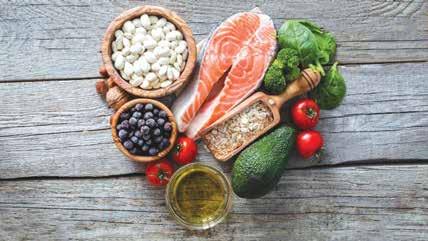
3 minute read
Healthy Heart Month by Cindy Weinberger, MS RD CDN
Health & F tness
Heart Health Month
By Cindy Weinberger MS, RD, CDN
Although February is approaching its short ending, it’s never too late to celebrate Heart Health Month.
Nothing is more important than taking care of your heart. Heart disease is the leading cause of morbidity and mortality in United States. The good news is that healthy lifestyle behaviors such as ideal dietary and physical activity patterns are the cornerstone of disease prevention.
Here are a few foods to include into your diets to help protect your heart: • Salmon: Salmon is one of the best sources of omega-3 fatty acids. Omega-3 fatty acids are anti-inflammatory agents that help protect the blood vessels and arteries. Salmon is also one of the healthiest protein sources one can eat and is low in calories. Salmon can be eaten raw as sushi, cooked, grilled, baked, poached, boiled, eaten in a salad, eaten as an appetizer or entrée, and even made into salmon patties! Salmon can be prepared in many ways, which makes it such a fun food as well as nutritious. • Walnuts: Walnuts are packed with nutrients that keep your body healthy and happy, such as manganese, copper, iron, calcium, and phosphorus. Walnuts are packed with healthy lean protein, polyunsaturated fats, and polyphenols. Walnuts also contain more antioxidants, folic acid, and vitamin E than any other nut. Scientific evidence shows that incorporating walnuts into a healthy diet reduces the risk of heart disease by improving blood vessel elasticity and plaque accumulation. In addition, walnuts have been shown to aid in lowering LDL cholesterol. Lastly, walnuts, like salmon, are a great source of omega-3 fatty acids. • Blueberries: All fruits contain antioxidants; however, blueberries are one of the best sources. Antioxidants work by preventing reactive ox-
ygen species from causing damage to cells and clean up the gradual buildup of waste materials in damaged arterial walls, thus lowering blood pressure. Blueberries have been found to improve blood pressure, endothelial function, and arterial stiffness. In addition to the blood pressure-lowering effects of blueberries, blueberries are very rich in other nutrients such as vitamin C, B complex, vitamin E, vitamin A, copper, selenium, zinc, iron, phenolic compounds, and stilbenes, which all attribute to the many benefits of blueberries. • Oatmeal: Oatmeal is wellknown for its cholesterol-reducing effects. Oatmeal has been shown to lower LDL cholesterol, also known as “bad” cholesterol. By reducing LDL cholesterol, oatmeal helps protect the heart, which gives it the recognized title of “heart healthy.” In addition, oatmeal is high in fiber which also indirectly lowers cholesterol by binding to the cholesterol and excreting it from the body. • Olive Oil: Olive oil is consid-
A healthy heart makes a healthy you.
ered a monounsaturated fat. Monounsaturated fats help reduce cholesterol levels and the risk of heart disease and stoke when used as a substitute for saturated fats. Not only do monounsaturated fats indirectly lower your LDL, or “bad” cholesterol, simply by replacing saturated fats in your diet, research has shown that monounsaturated fats help increase your levels of HDL or “good” cholesterol. In addition to cholesterol-lowering effects, recent studies indicate that regular consumption of olive oil can help decrease both systolic and diastolic blood pressure, thus further promoting heart health. • Dark Chocolate: Research has found that eating up to 100g of chocolate each day is linked to lower risks of heart disease and strokes. Experts believe that the flavonoid antioxidants are responsible for preventing obesity and diabetes, which, in turn, prevents heart disease and stroke.
The guidelines for the heart health for both men and women emphasize intake of fruits and vegetables, whole grains, low-fat dairy products, poultry, fish, legumes, nuts, and olive oil and a limited intake of sodium, sweets, sugar-sweetened beverages, and red meats.
February is Heart Health Month, but these guidelines should be followed all months of the year, all days of week, at all hours of the day. A healthy heart makes a healthy you.
Cindy Weinberger MS, RD, CDN, is a Master’s level Registered Dietitian and Certified Dietitian-Nutritionist. She graduated CUNY Brooklyn College receiving a Bachelor’s in Science and Master’s degree in Nutrition and Food Sciences. She is currently a private nutritionist. She can be reached at CindyWeinberger1@gmail.com or at 917-623-6237.











